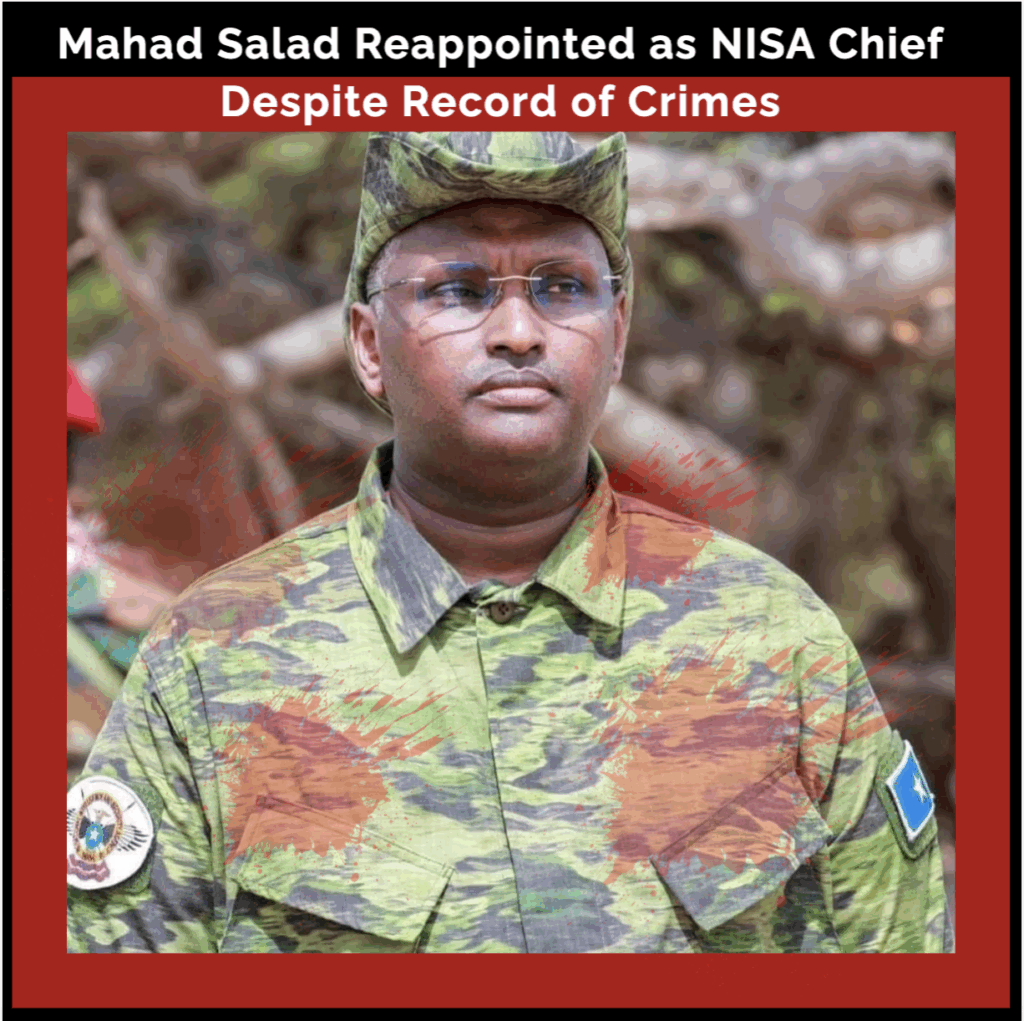MOGADISHU (Kaab TV) – On June 14, 2025, Somalia took a disturbing step backward. Mahad Mohamed Salad, a man accused of orchestrating widespread abuses, clan favoritism, and targeted attacks on civil society, and has links to Al-Shabaab was officially reinstated as director of the National Intelligence and Security Agency (NISA).
His return not only revives painful memories of unlawful detentions, journalist abductions, and extrajudicial killings—it signals that Somalia’s leadership remains willfully blind to the cries of its most vulnerable citizens, undermining what little progress the country has made toward justice, accountability, and peace.
Mr. Salad was first appointed on 26 May 2022 but dismissed on 4 April 2024 following sustained reports of human rights violations, corruption, and gross misuse of intelligence authority.
His tenure was marked by systematic targeting of journalists, civil society groups, minority communities, and the private sector.
Even more troubling are persistent allegations of links to terror networks, including involvement in the disappearance and suspected murder of NISA cybersecurity officer Ikran Tahlil Farah in 2021, who was reportedly handed over to Al-Shabaab operatives.
Despite public outcry and widespread suspicion, the case remains unsolved and has been deliberately silenced by government officials.
From the outset, Salad’s leadership of NISA was defined by fear. On 10 October 2022, NISA agents led by a former Al-Shabaab defector raided the office of the Somali Journalists Syndicate (SJS) in Mogadishu.
The next day, SJS Secretary-General Abdalle Ahmed Mumin was abducted by NISA agents at Aden Adde International Airport and held incommunicado in an underground cell, where he survived an assassination attempt. On 23 February 2023, under orders from Salad and in collusion with Deputy Information Minister Abdirahman Yusuf Al-Adala, Mumin was again abducted from a public meeting and held for 33 days in secret facilities, where he endured torture.
These cases were not isolated.
On 18 December 2022, UK-based Channel 4 News correspondent Jamal Muhumed Osman was detained and deported by NISA. On 20 February 2023, Radio Kulmiye reporters covering a public election were detained without charges.
On 17 August 2023, SJS Secretary of Human Rights Mohamed Ibrahim Bulbul was kidnapped after reporting on police corruption. He was detained for 56 days and subjected to physical and psychological torture. His tormentor was allegedly Mohamed Kafi Abukar, a known NISA officer and cousin of Mahad Salad.
The broader media landscape also suffered under Salad’s authoritarian rule. NISA embedded informants in newsrooms, prompting widespread self-censorship. Journalists fled Somalia en masse between 2022 and 2024, citing death threats, surveillance, and blackmail by NISA operatives. Those who remained were forced into silence, consolidating state control over public discourse.
Gruesome murder of Abdinasir Muse Dahable
In February 2024, Somalia was rocked by the gruesome murder of Abdinasir Muse Dahable, a UK-trained air traffic controller. Tortured and strangled, his body was found dumped in his apartment.
Investigations implicated NISA officers under Salad’s command. One key suspect, Hassan Dahir, fled to Nairobi, while others allegedly involved in the torture and cover-up continued to operate with impunity. Journalists investigating the murder were warned to keep silent—or face death.
One month later, on 18 March 2024, a Turkish drone strike in Afgoye killed 23 civilians, including 14 children and 5 women from the marginalized Gorgaarte clan, based on faulty intelligence provided by NISA.
Survivors and grieving families were threatened by intelligence agents and government spokespersons when they tried to speak out.
Local reporters documenting the massacre were accused of terrorism and forced into hiding.
During Salad’s rule, private businesses were not spared. In early 2024, Hormuud Telecom and its subsidiary Salaam Bank were raided by armed NISA agents. Staff were detained, operations halted, and sensitive customer data demanded. The campaign also saw a dozen of company employees killed in suspicious manner.
Business owners and market traders in Mogadishu were extorted under the pretext of “security fees,” and aid convoys were stopped unless portions were surrendered to NISA personnel.
The reappointment of Mahad Salad—despite these chilling events—is a brazen insult to Somalia’s citizens, journalists, business leaders, and minority communities.
No independent investigation has ever been launched into his crimes. No justice has been served for the abducted, tortured, or killed. Instead of accountability, Salad has been rewarded—again.
As Somalia stands at a crossroads, the international community must not stay silent. Donor nations, especially those funding Somali security and governance programs, must demand investigations, impose consequences, and condition support on real reforms.
Somalia’s people deserve safety, justice, and leaders who protect—not persecute—them.
